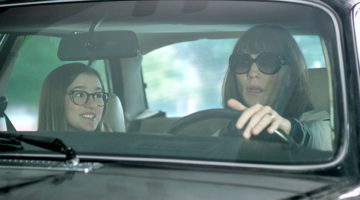Movie Review: Pariah
At a time when the beautiful and plagued heroine Lisbeth Salander has become a pop-culture icon, we can now welcome another equally beautiful and smart young woman, one who too lives in a world that struggles to accept her sexual identity and does not afford her the luxury of the innocence of youth. Pariah, written and directed by Dee Rees, tells the simple and all too common story of a teenager trying to find an identity.
Our titular protagonist is the loveable, hopeful, and infectiously charming Alike Freeman – a name that isn’t necessarily too clever—played with such earnestness by Adepero Oduye. Her simultaneous strength and vulnerability is on display from the opening scene in a nightclub, where Alike and her best friend Laura (Pernell Walker), dressed as tomboys, recount the number of women they picked up. As they ride the bus home, Alike removes her hood, shakes off some of the cumbersome male attire, dons earrings, and returns home as the angel her mother knows and desires.
 Adepero Oduye stars as “Alike” in PARIAH, an Alliance Films release.
Adepero Oduye stars as “Alike” in PARIAH, an Alliance Films release.
Alike (pronounced A-Leek-e) is black and gay, and it is the latter that some choose to accept and some choose to ignore. Her best friend supports her, naturally, her peers are curious, and her younger sister doesn’t care one way or another. It is the adults, dinosaurs from a different era struggling to catch up to the world around them, who would rather ignore and rebuff, rather than accept and celebrate.
Throughout most of the film, however, Alike’s race and sexuality don’t lead her into situations that are particularly unique. She struggles with thinking about losing her virginity, she gets teased by some peers while flirted with by others, and she laughs and fights with her family as any teenager would. The power and influence of the movies lies in its almost non-stop universality.
Sitting at the dinner table with her religious mother Audrey (Kim Wayans), police officer father Arthur (Charles Parnell), and at times annoying sister (Sahra Mellesse), Alike and her family have a incredibly humourous and endearing discussion about sex and dating. It is a conversation like so many others in the movie—one so realistic, so effortless, and so representatives of the lives of so many people.
The problems naturally go beyond simply sexual curiosities. Audrey is all too aware of un-ladylike appearances and attitudes of Alike, forcing her to change her outfits. Arthur, meanwhile, works too often and irregularly, and is at times incredibly warm and protective of his daughter, while at others seems in complete denial. Audrey subversively calls her daughter ‘Lee,’ and Arthur quickly corrects: ‘Alike.’
The word ‘denial’ may not come up much in the movie, but it is at the heart of the film. Audrey chooses to deny Alike’s physical expression, while Arthur denies her emotionally. Laura wants Alike to party and be more sexually active and flirtatious, while others in the film simply want Alike to keep quiet.
The film does not let you revel in the happiness and the humour and love of life, but it also does not drown you in sorrow and make you pay for the sins of others. It is not a harrowing experience to entail, and should make you tear up with laughter as much as you tear up with sadness – feelings which tend to come up suddenly.
Every performance is compelling, and every character is full of (mostly realistic) surprises, and it is only the mother who perhaps becomes a caricature, but is Oduye who shines. It is her powerful journey, and she grabs us instantly and takes us with her. Her smile lights up every room she enters; she is effortlessly compelling, painfully real, and ultimately inspiring, reaching the hearts and minds of everyone watching, transcending age, race, and gender.
[star v=4]




